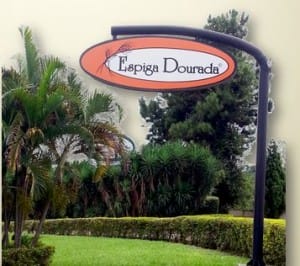 The Espiga Dourada story shows how dedication to helping the poor can inspire the entrepreneurial spirit. The artiginal bakery has achieved a great deal over the years, overcoming many obstacles and threats in the volatile environment along a major expressway on the outskirts of Brazil’s largest city. Started in 1988 as a bread-making initiative, selling loaves on the roadside, the enterprise was a forerunner of the Economy of Communion project which Chiara Lubich launched from Saõ Paulo in 1991. Espiga immediately embraced the courageous vision and values of this revolutionary new approach to economic activity. «It was during a serious economic crisis,” recalls Espiga pioneer Adriana Valle, originally from Italy, for the past 38 years in Brazil. “Money was scarce, there was rising inflation and high unemployment. In the midst of this situation, we were a group of girls with different talents and skills who got together to start baking bread and selling it from baskets to the drivers passing by the Focolare town “Mariapolis Ginetta” in Vargem Grande Paulista». They did this a few times, but when they suspended production for several days, drivers kept stopping and asking for the “girls with the bread and big smiles”. At this point, they realised it could be a permanent activity, offering work opportunities to local mothers and young people, to help them support their families and their education. There was no clear business plan at this time, but the customers kept growing in number, drawn by the friendly atmosphere. In 1994, the sales activity moved from the pavement to a small roadside store, at the same time as the Economy of Communion Business Park was developing close to the Focolare town. A second sales point was established on the other side of the road, bordering a favela slum, so that the people living there could buy their bread without the danger of crossing the busy highway.
The Espiga Dourada story shows how dedication to helping the poor can inspire the entrepreneurial spirit. The artiginal bakery has achieved a great deal over the years, overcoming many obstacles and threats in the volatile environment along a major expressway on the outskirts of Brazil’s largest city. Started in 1988 as a bread-making initiative, selling loaves on the roadside, the enterprise was a forerunner of the Economy of Communion project which Chiara Lubich launched from Saõ Paulo in 1991. Espiga immediately embraced the courageous vision and values of this revolutionary new approach to economic activity. «It was during a serious economic crisis,” recalls Espiga pioneer Adriana Valle, originally from Italy, for the past 38 years in Brazil. “Money was scarce, there was rising inflation and high unemployment. In the midst of this situation, we were a group of girls with different talents and skills who got together to start baking bread and selling it from baskets to the drivers passing by the Focolare town “Mariapolis Ginetta” in Vargem Grande Paulista». They did this a few times, but when they suspended production for several days, drivers kept stopping and asking for the “girls with the bread and big smiles”. At this point, they realised it could be a permanent activity, offering work opportunities to local mothers and young people, to help them support their families and their education. There was no clear business plan at this time, but the customers kept growing in number, drawn by the friendly atmosphere. In 1994, the sales activity moved from the pavement to a small roadside store, at the same time as the Economy of Communion Business Park was developing close to the Focolare town. A second sales point was established on the other side of the road, bordering a favela slum, so that the people living there could buy their bread without the danger of crossing the busy highway.  Chiara Lubich chose the names Espiga Dourada I and II for the two shops, with a logo showing a ripe ear of corn shining under the sun. The aim: to offer a welcoming, harmonious and calm environment with a family atmosphere for all who come. From the start, there were those convinced it would fail, people who scorned the possibility of success from such humble beginnings (“how can you hope to achieve anything with just half a sack of flour?”). Others held the faith, and got involved to make it work. For example, two local businessmen were so impressed by the progress made with such flimsy infrastructure, that they decided to contribute financially. This investment came just in time to avoid having to lay off some of the staff, and allowed plans to go ahead to improve and redesign the two locations and to raise the standards of the products on offer. Many customers have spoken of how these two bakeries have had an effect far beyond good-tasting bread. Some travel for kilometres just to experience the “positive energy” they find there as they enjoy their coffee and cake. Some discover the strength to make a new start in their lives, encouraged by the welcome they know they will find there. But it has not all been sweet aromas and smiling faces. The bakeries have been attacked several times. During the last incident, Adriana was ordered to empty the till by a masked gunman. At gunpoint, she found the courage to start talking with him. She told him how worried she was about how things would turn out for him and his gang once they went outside. Her sincere concern and respect disarmed the boys, literally. They even took off their masks and did no harm. And there have been no more incidents since then!
Chiara Lubich chose the names Espiga Dourada I and II for the two shops, with a logo showing a ripe ear of corn shining under the sun. The aim: to offer a welcoming, harmonious and calm environment with a family atmosphere for all who come. From the start, there were those convinced it would fail, people who scorned the possibility of success from such humble beginnings (“how can you hope to achieve anything with just half a sack of flour?”). Others held the faith, and got involved to make it work. For example, two local businessmen were so impressed by the progress made with such flimsy infrastructure, that they decided to contribute financially. This investment came just in time to avoid having to lay off some of the staff, and allowed plans to go ahead to improve and redesign the two locations and to raise the standards of the products on offer. Many customers have spoken of how these two bakeries have had an effect far beyond good-tasting bread. Some travel for kilometres just to experience the “positive energy” they find there as they enjoy their coffee and cake. Some discover the strength to make a new start in their lives, encouraged by the welcome they know they will find there. But it has not all been sweet aromas and smiling faces. The bakeries have been attacked several times. During the last incident, Adriana was ordered to empty the till by a masked gunman. At gunpoint, she found the courage to start talking with him. She told him how worried she was about how things would turn out for him and his gang once they went outside. Her sincere concern and respect disarmed the boys, literally. They even took off their masks and did no harm. And there have been no more incidents since then!  Today the bakery and two shops employ 20 part time and 15 young part time workers. They use ten sacks of flour and serve between 1,200 to 1,500 customers each day. For the more affluent weekend customers, they offer a selection of specialist breads, savoury dishes, cakes for special occasions, and their own artisanal ice-cream range. At the same time, they maintain production of high quality, low-price bread for their regular clients from the favelas. As well as creating jobs and working with an attitude of love, a cherished part of Espiga Dourada’s aim is to facilitate interaction between different social categories. Those less advantaged financially feel part of the Espiga family, while those who are better off come back, bringing their own contribution and then thank Espiga because they find they have received far more than they have given. Source: EdC online
Today the bakery and two shops employ 20 part time and 15 young part time workers. They use ten sacks of flour and serve between 1,200 to 1,500 customers each day. For the more affluent weekend customers, they offer a selection of specialist breads, savoury dishes, cakes for special occasions, and their own artisanal ice-cream range. At the same time, they maintain production of high quality, low-price bread for their regular clients from the favelas. As well as creating jobs and working with an attitude of love, a cherished part of Espiga Dourada’s aim is to facilitate interaction between different social categories. Those less advantaged financially feel part of the Espiga family, while those who are better off come back, bringing their own contribution and then thank Espiga because they find they have received far more than they have given. Source: EdC online
Put love into practice
Put love into practice




0 Comments